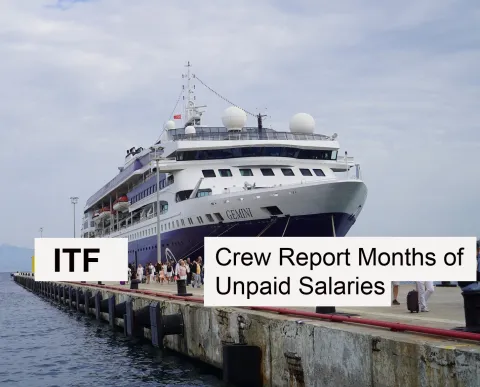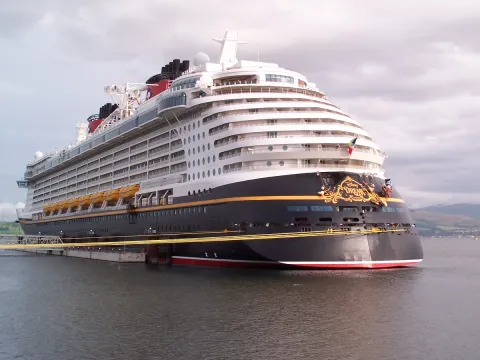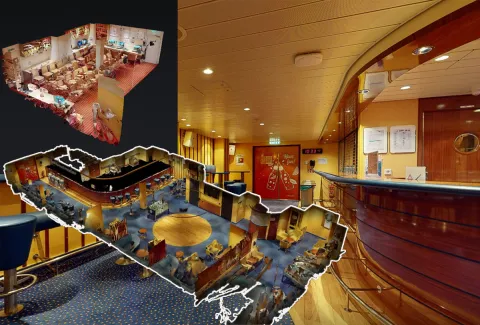
You probably know the answer immediately if you ever work on a cruise ship. The cruise ship industry is almost untouchable regarding its illegal actions against the crew members. Liability does not exist because cruise lines register their ships in Panama, Bahamas, Vanuatu, etc. It operates under the flag state law and usually has lesser regulations and labor policies. This harms its crew because the company does not need to comply with U.S. maritime law. For that reason, malpractices on board cruise ships often go unnoticed and kept being hidden underneath.
Major cruise line ships flagged in the Bahamas include Carnival, Disney, Royal Caribbean, and Norwegian Cruise Lines. More than a third of the workers on board cruise ships work 10- to 14-hour days, seven days a week. The result can be that many workers spend their first few months working off an enormous debt -- what union officials consider a state of indentured servitude. Officials from the cruise industry generally deny these charges. Yet, the cruise line representative says working on a cruise ship offers employees "a positive and comfortable working environment and an opportunity to earn tremendously higher wages than they can in their homeland."
Well, I guess if you work back home 350 hours per month without a day off, you will probably earn the same salary.
PERKS OF THE REGISTRY
Ship owners seeking the Bahamian flag do not have to be based in the Bahamas, and offshore profits are not taxed. They are not required to disclose any details of their company when they register and are guaranteed that these details cannot be accessed through public records.
Crew Costs Makes a Difference
According to a report from the U.S. Department of Transportation that explored the costs of operating a foreign-flagged merchant ship versus U.S. merchant ships, the average daily crew cost for U.S.-flagged ships was approximately 5.3 times that of foreign-flagged vessels.
Now, this report didn't look specifically at cruise ships — after all, only one major cruise ship is flagged in America, so it's challenging to get enough data to compare.
But as you know, cruise ships have a large number of staff. Royal Caribbean's Symphony of the Seas — the world's largest cruise ship — has 2,200 crew members. It is registered in the Bahamas.
While employees do get, things like room and board included, they also work notoriously long hours.
Why is crew so much more expensive on a U.S.-flagged ship? Ships registered in the U.S. must hire American citizens to crew the ships to comply with American law. But foreign-flagged vessels from certain countries can hire from less expensive foreign labor pools.
If you've cruised before, you've likely noticed that the staff is genuinely global, coming from everywhere, including China, the Philippines, India, and many more.
The Department of Transportation report stated that "as is true for most industries employing U.S. citizens, carriers suggested that the "Citizen Crew Requirement" results in higher manning requirements, higher wages, and higher benefits compared to foreign registries."
Operating Costs & Insurance Are Other Factors
In addition to the cost of crewing a ship, it's also more expensive to have a U.S.-flagged ship when it comes to other operating expenses such as repairs and insurance.
Insurance and liability is another factor to consider. With thousands of passengers and crew on the ship at any time, incidents are bound to happen. And according to the Department of Transportation, insurance costs can be four to five times higher in the United States than in foreign registries. The reason? The report points to increased liability costs associated with personal injury for U.S. carriers.
Taxes and Foreign Cruise Companies
What about taxes? Many people point to U.S. tax avoidance because ships are flagged in foreign countries.
While being foreign-flagged doesn't hurt, the tax benefits — especially federal income taxes — seem to be a big reason cruise companies are incorporated in foreign nations instead of the United States.
Carnival Corporation is incorporated in Panama. Royal Caribbean Group is based in Liberia. And Norwegian Cruise Line Holdings is in Bermuda. Since the cruise companies are foreign entities, they would fly under a flag other than the United States.
All the major cruise lines point to something called "Section 883" of the Internal Revenue Code in their financial filings. This section of the tax code says that foreign companies are not subject to U.S. federal tax if they earn income from the international operation of ships, the company meets rules for ownership of its stock, and the country they are based in grants a similar exemption to American vessels.
Panama, Liberia, and Bermuda grant these exemptions.
The Drawbacks of Not Being Flagged in the United States
Of course, while there are benefits to being a foreign-flagged vessel, there are also drawbacks.
The first we saw during the recent health crisis. As cruises stopped in the face of the pandemic, they had to figure out a way to survive while earning no revenue. While many industries saw government bailouts, cruise lines were excluded due to their foreign status. Many pointed out that so many ships are flagged outside the U.S.
Instead, cruise companies had to issue large amounts of stock and take on debt to see through the pause in operations.
There are also rules regarding the itineraries of foreign-flagged cruise ships when sailing from the United States. You'll notice that cruise ships stop in a foreign port before returning to the U.S. Laws surrounding passengers carrying on foreign-flagged ships mean that you can't take a cruise with stops only in the United States.
Because of this rule, it was the Canadian government that first put an end to the Alaskan cruise season in 2020. Canada banned large ships from docking in their ports.
Without the chance to stop in Canada, cruises to Alaska — which typically stops in Victoria, British Columbia, to satisfy U.S. laws — were effectively canceled even if the United States CDC had lifted the "No Sail Order" it had in place.
If a cruise ship does want to sail from U.S. port to U.S. port — without stopping in a foreign country — then they have to be flagged in the United States, which also means having an American crew.
At this time, there is one major cruise ship that does this: Norwegian Cruise Line's Pride of America. This ship sails the Hawaiian islands, where it would be difficult to visit a foreign port on a trip, given the location.
Among the most significant challenges was finding Americans to work the ship, according to an NPR story regarding the vessel's launch about 15 years ago. Not only are there cost considerations, but many foreign crewmembers are familiar with the hard work and long hours that go into working on a cruise ship.
Notably, despite Pride of America being around for over a decade, other major cruise lines haven't followed suit in offering Hawaiian trips on U.S.-flagged vessels — or anywhere else.
What Foreign-Flagging Means for Passengers?
So what does sailing a foreign-flagged vessel mean for passengers?
Most passengers will never even notice, as it has little day-to-day impact on their vacation.
On the positive side, cruising is known for being affordable, which is obviously tied to the costs of operating the ship. If it is less expensive for a cruise ship to operate under a foreign flag, it allows for cheaper cruise fares than otherwise. Where else can you get a week-long trip to the Caribbean, including all your food and entertainment, and not break the bank?
But there is a negative aspect. Although rare, accidents and crime can occur on a cruise. Here, the legal situation can get complex. Everything from where the ship sailed from, where the incident occurred, and where the ship is flagged can all impact how the incident is handled. Thankfully, this impacts relatively few passengers, but for those it does affect, the consequences can be frustrating.
And don't get the impression that ships need oversight from U.S. authorities. When sailing from a U.S. port, ships must follow many American rules and regulations. That's why the CDC can issue a "No Sail Order" and perform ship health inspections. It's also why in the case of crime, the FBI holds some authority in investigating.
Even so, most of those on the ship never notice that a vessel sails under a foreign flag or understand why.
Crew Insights
Articles and experiences shared by crew members working on cruise ship. Find out more about ship life at sea together with tips and advices for first time crew members and cruise oldtimers.












